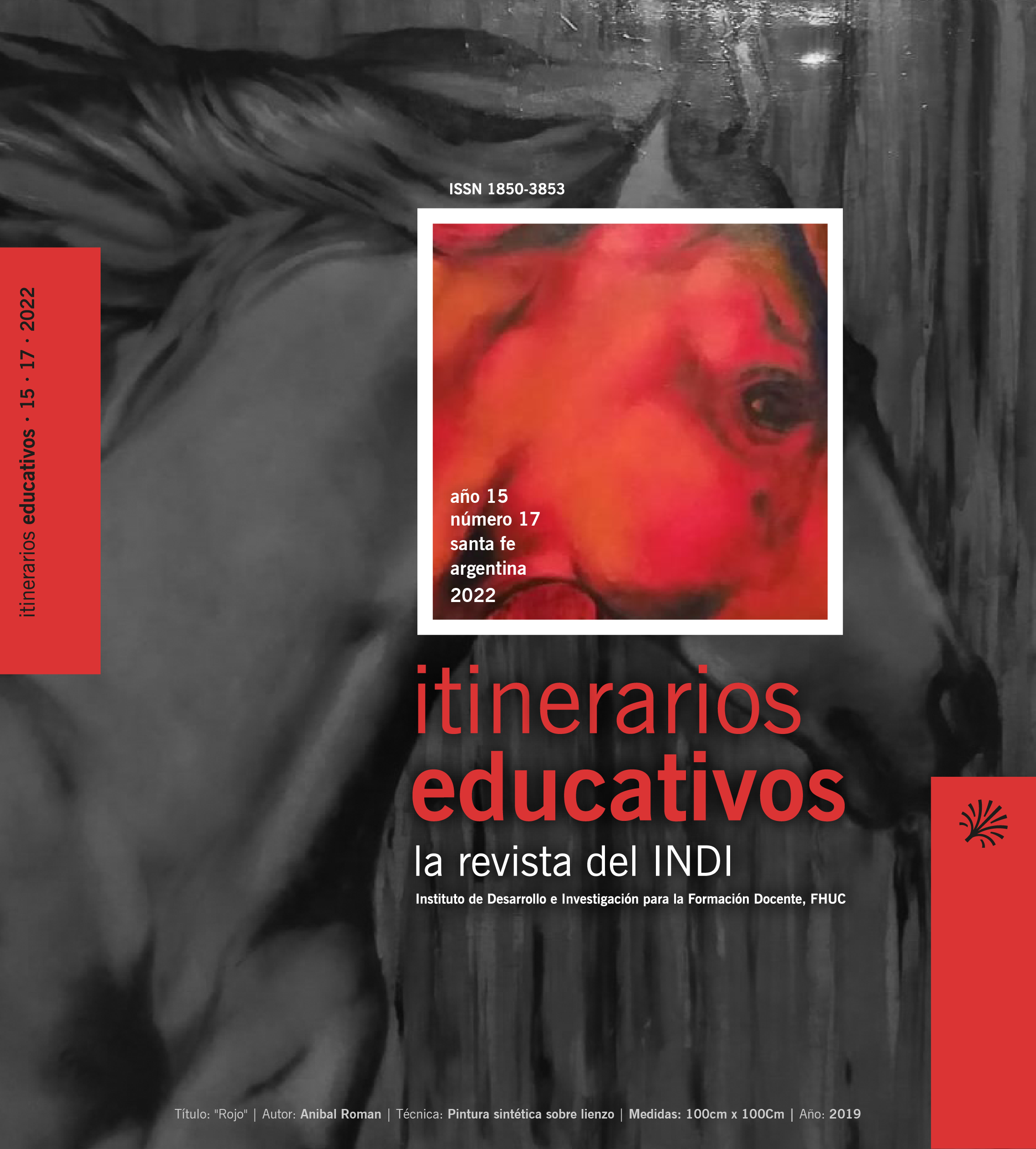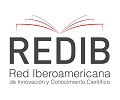Prácticas evaluativas y acuerdos docentes en la formación del profesorado en Geografía
DOI:
https://doi.org/10.14409/ie.2022.17.e0040Palabras clave:
Geografía, formación, evaluación, articulaciónResumen
La evaluación de las prácticas de enseñanza en la formación docente ofrece posibilidades de mejorar las enseñanzas y los aprendizajes. Los instrumentos permiten recabar evidencias de aprendizajes, de este modo tienen que ser claros y compartidos a tiempo con las y los estudiantes para que se desarrollen los cambios necesarios en sus prácticas. La retroalimentación representa el proceso de autorregulación de los aprendizajes. Es por ello, que cuanto más diversos sean estos instrumentos se podrán recoger mayor cantidad de registros de aprendizajes. En este sentido, las rúbricas se transforman en un dispositivo relevante con el propósito de brindar información que trascienda hacia la calidad de los aprendizajes. El presente trabajo asume como objetivo el análisis y la reflexión sobre el trabajo articulado entre las asignaturas Didáctica Especial de la Geografía y Residencia Docente mediante el uso de rúbricas como asistentes de evaluación de los aprendizajes. La reflexión permite la indagación acerca de las estrategias de articulación que favorecen la integración de las prácticas evaluativas que nos lleva a repensar la formación docente. Los resultados alcanzados en relación a las prácticas de evaluación sustentadas en acuerdos pedagógicos otorgan continuidad en el desarrollo de estrategias de articulación en las futuras prácticas pedagógicas.
Citas
Acosta, M. y Leduc, Stella M. (2021). Evaluación de los aprendizajes en Residencia Docente en contexto de pandemia (En evaluación).
Álvarez Méndez, J.M. (2001). El campo semántico de la evaluación. Más allá de las definiciones. Capítulo Primero. En Evaluar para conocer, examinar para excluir. Madrid: Edit. Morata. Recuperado de: https://www.fceia.unr.edu.ar/geii/maestria/2013/10masCelman/%C3%81lvarez%20M%C3%A9ndez–Evaluar%20para%20conocer%20examinar%20para%20excluir006.pdf
Anijovich, R. (2014). Gestionar una escuela con aulas heterogéneas. Enseñar y aprender en la diversidad. Buenos Aires: Paidós.
Anijovich, R. y Cappelletti, G. (2017). La Evaluación como oportunidad. Buenos Aires, Argentina: Paidós.
Anijovich, R. y Cappelletti, G. (2020). El sentido de la escuela secundaria. Nuevas prácticas, nuevos caminos. Buenos Aires, Argentina: Paidós.
Camilloni, A. (2009). Prólogo. En Anijovich, R; Cappelletti, G, Mora, S y Sabelli, M. J. Transitar la Formación pedagógica. Dispositivos y estrategias. Pp.15–20. Buenos Aires: Paidós.
Davini, M. C. (2009). Métodos de enseñanza. Didáctica general para maestros y profesores. Buenos Aires: Santillana.
Davini, M.C. (2015). La formación en la práctica docente. Buenos Aires: Paidós.
Ferry, G. (1990). El trayecto de la formación. La enseñanza entre la teoría y la práctica. México: Paidós.
Gardner, H. (1999). The disciplined mind: what all students should understand. Nueva York: Simon & Schuster.
Jackson, P. (1990). La vida en las aulas. Madrid: Morata.
Leduc, S. y Acosta, M. (2016). Pensar la evaluación. Los desafíos de la práctica docente. En Didáctica de la Geografía. Debates comprometidos con la actualidad: enseñanza e investigación en la formación docente, María Amalia Lorda y María Natalia Prieto, coordinadoras, ISBN 978–987–655–139–7, págs. 230–246.
Leduc, S. M. y Acosta, M. (2018). La evaluación como perspectiva de análisis y abordaje en Residencia Docente del Profesorado en Geografía. En Los Aportes de la Didáctica de las Ciencias Sociales, la Geografía y la Historia a la Formación de la Ciudadanía en los Contextos Iberoamericanos. Serie Actas – Parte I.; coordinación general de Miguel Ángel Jara; Graciela Funes; Fabiana Ertola y María Cristina Nin – 1a edición especial. – Cipolletti: Miguel Angel Jara, 2018. Libro digital, Book app for Android Archivo Digital: descarga ISBN 978–987–42–9448–7 pp. 281–289.
Leduc, S. M. y Acosta, M. (2020–2021). Programa Residencia Docente. Recuperado de: https://drive.google.com/file/d/1vOQCm57atfPJnY2obWiitazM88EA847q/view Litwin, E. (2008). El oficio de enseñar. Condiciones y Contextos. Buenos Aires: Paidós.
Maggio, M. (2018). Reinventar la clase en la Universidad. Buenos Aires: Paidós.
Moreno Olivos, T. (2011). La cultura de la evaluación y la mejora de la escuela. Perfiles Educativos, vol. XXXIII, núm. 131, 2011, pp. 116–130. Instituto de Investigaciones sobre la Universidad y la Educación Distrito Federal, México. Recuperado de: https://www.redalyc.org/pdf/132/13218531008.pdf
Nin, M. C. y Acosta, M. (2020–2021). Programa Didáctica Especial de la Geografía. Recuperado de: https://drive.google.com/file/d/119VeijP6yijldVCr8JH2Lqu3snRHJaE8/view
Nin, M. C. y Acosta, M. I. (2020). Prácticas evaluativas en la enseñanza de la geografía en educación secundaria. Boletín geográfico, 42(1), 83–102.
Nin, M. C., Leduc, S. M. y Acosta, M. I. (2020). La planificación como objeto de investigación en la formación docente en Geografía. REIDICS, 6, 2020, pp. 94–111. Recuperado de: https://mascvuex.unex.es/revistas/index.php/reidics/article/view/3644/2447
Nin, M. C; Leduc, S. M y Acosta, M. (2019). Formación docente en el Profesorado de Geografía. Diálogos, debates y articulaciones. Capítulo 1, pp. 15–28. En Geografía y enseñanza. Investigación, reflexiones y prácticas. Nin, M.C. (Compiladora). Santa Rosa: EdUNLPam.
Perkins, D. y Blythe, T. (1994). Putting understanding up front. In Educational Leadership, vol. 51, núm. 2, pp. 4–7.
Perkins, D. (2010). El aprendizaje pleno. Principios de la enseñanza para transformar la educación. Buenos Aires: Paidós.
Perrenoud, P. (2008). La Evaluación de los alumnos. De la producción de la excelencia a la regulación de los aprendizajes. Entre dos lógicas. Buenos Aires: Colihue.
Ravela, P., Picaroni, B., Loreiro, G. (2017). ¿Cómo mejorar la evaluación en el aula? Reflexiones y propuestas de trabajo para docentes. Colección Aprendizajes Clave. Para Educación Integral. Recuperado de: https://bibliospd.files.wordpress.com/2019/01/como–mejorar–la–evaluacion–en–el–aula.pdf
Sanjurjo, L. (2005). La formación práctica de profesores. Reflexión en el aula. Rosario. Homo Sapiens
Sanjurjo, L. (2019). La formación en la práctica docente: avances y desafíos. Voces en el Fénix N° 75. Recuperado de: https://vocesenelfenix.economicas.uba.ar/la-formacion-en-la-practica-docente-avances-y-desafios/
Santos Guerra, M. A. (2017). Evaluar con el corazón. De los ríos de las teorías al mar de la práctica. Rosario: Homo Sapiens.
Publicado
Cómo citar
Número
Sección
Licencia
Aviso de derechos de autor/a
Los autores que publican en esta revista están de acuerdo con los siguientes términos:
- Los autores conservan los derechos de autor y garantizan a la revista el derecho de ser la primera publicación del trabajo al igual que licenciado bajo una Creative Commons Attribution License que permite a otros compartir el trabajo con un reconocimiento de la autoría del trabajo y la publicación inicial en esta revista.
- Los autores pueden establecer por separado acuerdos adicionales para la distribución no exclusiva de la versión de la obra publicada en la revista (por ejemplo, situarlo en un repositorio institucional o publicarlo en un libro), con un reconocimiento de su publicación inicial en esta revista.
- Se permite y se anima a los autores a difundir sus trabajos electrónicamente (por ejemplo, en repositorios institucionales o en su propio sitio web) antes y durante el proceso de envío, ya que puede dar lugar a intercambios productivos, así como a una citación más temprana y mayor de los trabajos publicados (Véase The Effect of Open Access).












